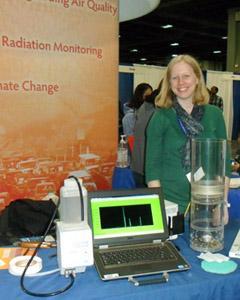Meet EPA Engineer Gayle Hagler, Ph.D.

Something in the Air?
What's in the air you breathe? Pinpointing the sources of local air pollution can be a real challenge. That's where the work of EPA environmental engineer Gayle Hagler, Ph.D, comes in.
Gayle helps develop innovative ways to measure air pollution—and where it comes from—through field studies, data analysis and computer modeling. She has been deeply involved with an EPA research program that explores near-roadway air pollution sources and other local air pollution emissions—and thanks to her work she has recently met the President!
- Geospatial Measurements of Air Pollution (GMAP)
- Near-Roadway Research
- Meeting the President: Our PECASE Story
How does your science matter?
I, personally, experience why understanding local air pollution matters: it is something I consider when I think about where my child is in day care, where I live, where my friends live. I quickly see that immediate link and why it matters.
My research links to air quality and climate.
On the air quality side, a lot of my research recently has focused on what we call "near-source air pollution", which is looking at the air pollution levels in areas very close to a major source, such as a highway. The research question we are asking is—what are the air pollution levels and health risks associated with living in close proximity to sources?
In that case, my colleagues and I are looking at environments where people are living and where they may be exposed to higher levels of air pollution, and how it may be affecting their health.
On the climate side, some of my research here at EPA involves looking at particles—black carbon—that may contribute to climate warming. Black carbon is a component of particles in the air that is commonly produced by burning wood or fossil fuels.
If you could have dinner with any scientist past or present, who would it be and what would you like to ask them about?
Maybe it's living in North Carolina that makes me think about this, but it would be the Wright brothers. At some point they thought, 'Hey, maybe we could actually fly.' I would like to have dinner with them, they must've been really interesting people and marching to their own drum beat.
I would say the scientist I would want to have dinner with who is still alive would be my sister. My older sister is a pediatric cardiologist and does research projects studying infant heart conditions. I would love to somehow find a way to collaborate with her.
What do you like most about your research?
I am wired to be a 'jack-of-all-trades' researcher because I like having a lot of variety in what I do. I enjoy all the variety in air pollution research – my days can include chemistry, physics, meteorology, working hands-on with measurement equipment, and computer programming. I find both the science and the impact of the research very interesting. Most importantly, the point of the research has great meaning to me personally.
When did you first know you wanted to pursue science?
I think I was more of a late-bloomer than most people when it comes to thinking of myself as a scientist or an engineer. Until I was late in high school, I would not have considered myself ever going into a scientific field. I mostly ranged from the liberal arts side to music, and I was settling into wanting to be a musician.
One afternoon my high school physics teacher said, 'Wow, you're picking this up a lot faster than you realize, and you might have a knack for this.' That comment sort of lit off a bell for me.
Tell us about your science/educational background.
I went to Georgia Institute of Technology (go Yellow Jackets!) in Atlanta. Georgia Tech is a major engineering school and when I started there my major was officially "undecided". After exploring and getting a lot of advice, I ended up in civil and environmental engineering.
I continued on at Georgia Tech in a graduate program in environmental engineering. I ended up focusing my doctorial research on air pollution.
Any advice for students considering a science career?
If you think about almost any sport you have learned, it takes a lot of practice. No one's good at soccer when they start, or at baseball or football or at any sport. It takes years of practice, and it really takes you just liking it and wanting to spend a lot of time doing it.
I think my advice would be to figure out if you like science, focus on what is interesting and fun, and don't worry so much about whether or not you're good at it. Just keep practicing and have a good time.
